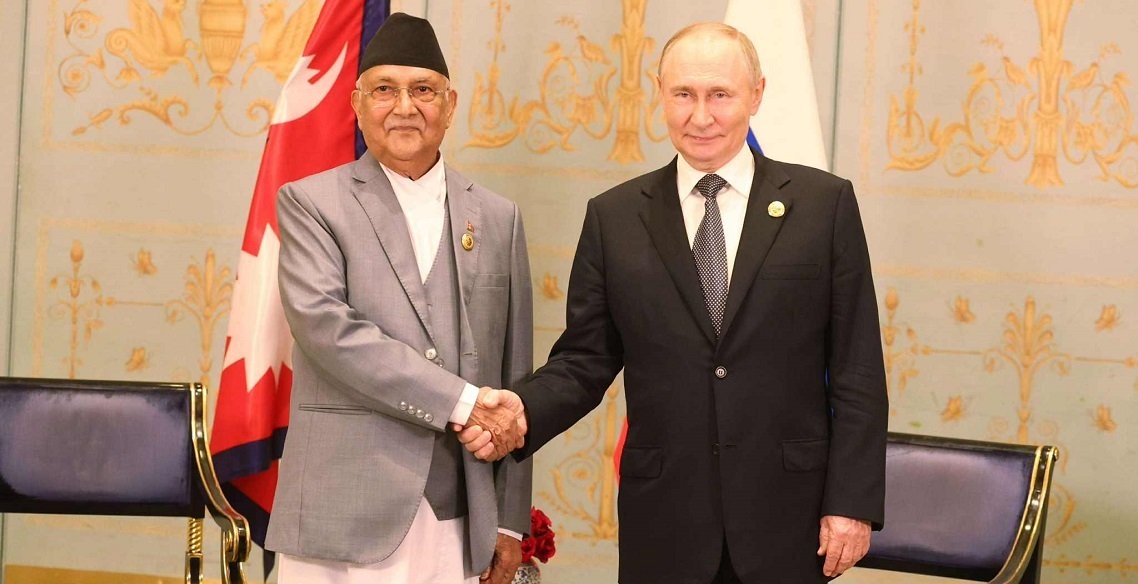Nepal Expands Global Diplomacy (SCO)
In a significant move for Nepal’s foreign policy, Prime Minister KP Sharma Oli met with Russian President Vladimir Putin on the sidelines of the Shanghai Cooperation Organization (SCO) Summit in Tianjin, China. The meeting, held on Monday evening, reflects Nepal’s growing efforts to expand its international engagement and diversify strategic relations beyond its immediate neighbors, India and China.
Rare High-Level Engagement with Russia
This high-profile meeting marks one of the rare instances in recent years where a Nepali head of government held direct talks with the Russian President. Historically, Nepal and Russia have maintained cordial ties, but interactions at the leadership level have been limited. The Oli-Putin dialogue is therefore seen as a diplomatic step aimed at reviving and strengthening Nepal-Russia relations in the modern geopolitical context.
Nepal and the SCO
The Shanghai Cooperation Organization (SCO) is one of the largest regional blocs in the world, focusing on security, economic cooperation, counter-terrorism, and connectivity. While Nepal is not a full member, it holds the status of a dialogue partner, allowing it to take part in various discussions and engage with key regional powers.
By attending the summit,
Prime Minister Oli not only represented Nepal in a multilateral forum but also utilized the opportunity to engage in bilateral diplomacy with leaders of major powers, including Russia. This reflects Nepal’s desire to balance its foreign policy in a multipolar world.
Discussion Points Between Oli and Putin
During the meeting, Prime Minister Oli and President Putin reportedly discussed the following:
Strengthening Bilateral Relations: Both leaders expressed willingness to deepen Nepal-Russia cooperation in areas such as trade, investment, energy, and education.
Regional Security: Given the SCO’s focus on security issues, discussions also touched on regional stability, counter-terrorism, and peace efforts.
Economic Cooperation: Nepal has shown interest in exploring Russian markets for its products and seeking Russian investment in hydropower and infrastructure projects.
Cultural and Educational Exchange: The two leaders also highlighted the historical presence of Nepali students in Russian universities and the potential to further boost academic and cultural exchanges.
Nepal’s Balancing Act in Global Politics
Nepal’s meeting with Russia at a time when geopolitical tensions are high demonstrates Kathmandu’s strategy of pursuing a balanced foreign policy. Traditionally sandwiched between India and China, Nepal has often been seen as dependent on its two giant neighbors. However, Oli’s outreach to Russia sends a message that Nepal seeks to establish independent and diversified diplomatic relations.
In an era of shifting global power, smaller nations like Nepal are trying to position themselves strategically by engaging with multiple powers, including Russia, China, the United States, and European countries.
Historical Context of Nepal-Russia Relations
Nepal and Russia (then the Soviet Union) established diplomatic relations in 1956. Since then:
Russia supported Nepal in the field of education, offering scholarships to Nepali students in medicine, engineering, and science.
During the Cold War, Nepal maintained a non-aligned foreign policy, building ties with both Western and Eastern blocs.
Russian assistance also contributed to some technical and infrastructure projects in Nepal.
However, in recent decades, active engagement between the two countries has been relatively limited. The Oli-Putin meeting is therefore seen as a step to revitalize the dormant partnership.
Significance of the Meeting for Nepal
For Nepal, the meeting holds several layers of significance:
Diplomatic Visibility – By meeting President Putin, Prime Minister Oli elevated Nepal’s diplomatic profile on an international platform.
Strategic Diversification – It provides Nepal with an opportunity to diversify its foreign relations, reducing over-reliance on India and China.
Economic Opportunity – If translated into practical agreements, the meeting could open avenues for trade, technology transfer, and investments.
Educational and Cultural Growth – Enhanced cooperation with Russia could strengthen people-to-people connections, particularly in education.
Regional and Global Implications
The meeting also has regional and global implications. At a time when Russia is seeking to expand its influence in South Asia and Asia-Pacific, engaging with Nepal provides Moscow with an additional partner in the region. For Nepal, aligning with Russia within the SCO framework could strengthen its voice on regional cooperation and security issues.
Moreover, as global politics shift towards multipolarity, small states like Nepal benefit from maintaining open channels with all major powers. The Oli-Putin engagement reflects this pragmatic approach.
A Step Towards Stronger Nepal-Russia Ties
The meeting between Prime Minister KP Sharma Oli and President Vladimir Putin at the SCO Summit in Tianjin marks a diplomatic milestone for Nepal. While concrete outcomes are yet to be seen, the dialogue underscores Nepal’s intention to strengthen ties with Russia, diversify its foreign policy, and play a more active role in regional forums.
For Nepal, the challenge ahead will be to translate such high-level meetings into long-term strategic partnerships that benefit its economy, security, and global standing.

[…] 2025: Exploring the Best Destinations UML Calls for Oli to Step Down Amid Gen-G Pressure PM Oli and Russian President Putin meet at SCO Summit Lumbini-Gandaki participation in tourism and infrastructure Dr. Sapkota designated as […]